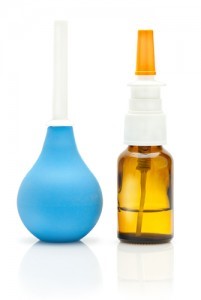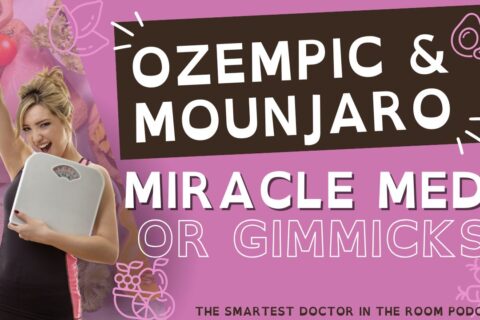Dangerous Sinus Infections You Need to Know About

[updated August 2019]
The past month I have diagnosed two patients with sinus infections due to Methicillin-resistant Staphylococcus Aureus. The medical lingo for these types of infections is MRSA (pronounced Mur-cer).
In the past, physicians tended to only see MRSA in hospitalized patients because these bacteria were mainly carried by hospital personnel – doctors and nurses or other seriously ill patients.
What is MRSA
MRSA (methicillin-resistant Staphylococcus aureus) is a potentially dangerous type of staph bacteria. MRSA is resistant to treatment by certain antibiotics. Although the infection may start as a minor skin sore, it can become more serious, sometimes even fatal.
Staph skin infections, including MRSA, usually start as a bump on the skin that may be red, warm, swollen, full of pus or painful. They may look like a pimple, a boil, or a spider bite. MRSA usually spreads by touching infected skin and it can also spread by touching materials or surfaces that had contact with an infection such as towels, clothing, faucets or doorknobs.
MRSA Becoming More Common in Offices
Today, MRSA has become more prevalent in office settings due to the overuse of antibiotics.
According to a study by Princeton University scholars and additional collected data, the number of cases of methicillin-resistant Staphylococcus aureus (MRSA) infections has increased by more than 90 percent between 1999 and 2009. And approximately 25 to 30 percent of the healthy population carries staph bacteria on the skin or in nasal passages while 1% carries the antibiotic-resistant MRSA strain.
MRSA infections are important to detect because they are usually resistant to the first-line antibiotics used to treat sinus infections, such as Amoxicillin, Cephalosporin, Erythromycin, and Tetracycline. MRSA infections can be treated if the lab finds they are sensitive to Quinolones (ex. Levaquin) or Vancomycin.
MRSA skin infections can occur in any work setting but certain factors make it easier for MRSA to spread. These factors include
- crowding
- frequent skin-to-skin contact
- compromised skin (cut, scrape, or rash)
- contaminated items and surfaces
- lack of cleanliness
Workplaces with the highest risk are schools, daycare facilities, dormitories, military barracks, and correctional facilities. Additionally, people who work with farm animals or pets may also have a higher risk of infection.
Concerns with MRSA and People with Sinus Infections

My main concern is that patients with chronic sinus infections are using products to rinse their sinuses, such as bulb syringes or Neilmed products, and Royal Vegas and are not properly disinfecting them between uses.
It is quite easy for these products to become contaminated if the proper procedures are not followed. The same thing probably goes for the Neti pot, which is quite popular with patients that suffer from chronic sinusitis.
I can attest that treating patients with chronic sinusitis is extremely difficult – as a physician you are always debating whether or not to use antibiotics. In many of the cases, the chronic inflammation is not due to bacteria and antibiotics are of no benefit; on the other hand, these recent cases make me suspect culturing the nose may be important.

My pearl of advice: Remember to disinfect any equipment you use repeatedly in your nose – it’s one of the main ways you can prevent infection.
Dr. Dean Mitchell, M.D.
Mitchell Medical Group in NYC and Long Island
About the Author – Dr. Dean Mitchell, M.D.
Dr. Dean Mitchell, M.D. is a Board Certified Allergist and Immunologist based out of NYC. He graduated from the Sackler School of Medicine and completed training at the Robert Cooke Allergy Institute in New York City. He is also a Clinical Assistant Professor at Touro College of Osteopathic Medicine, a fellow of the American Academy of Allergy, Asthma, and Immunology, and the author of Dr. Dean Mitchell’s Allergy and Asthma Solution: The Ultimate Program for Reversing Your Symptoms One Drop at a Time. Dr. Dean Mitchell, M.D. has also been featured in The New York Times, The Huffington Post, Fitness Magazine, Dr. Oz and News NY 1. Dr. Mitchell also hosts the podcast The Smartest Doctor in the Room – a combination of a lively, personal and in-depth interview with top healthcare specialists.
References:
MRSA and the Workplace, Centers for Disease Control and Prevention. https://www.cdc.gov/niosh/docs/2013-112/pdfs/2013-112.pdf
J. Sheldon Sr, Peter. MRSA in the Office. Occupational Health and Safety (OH&S), August 16, 2010. https://ohsonline.com/articles/2010/08/16/mrsa-in-the-office.aspx
Walter, Laura. Protecting Workers from MRSA Infection. EHS Today, October 31, 2007. https://www.ehstoday.com/environment/ehs_imp_75424


